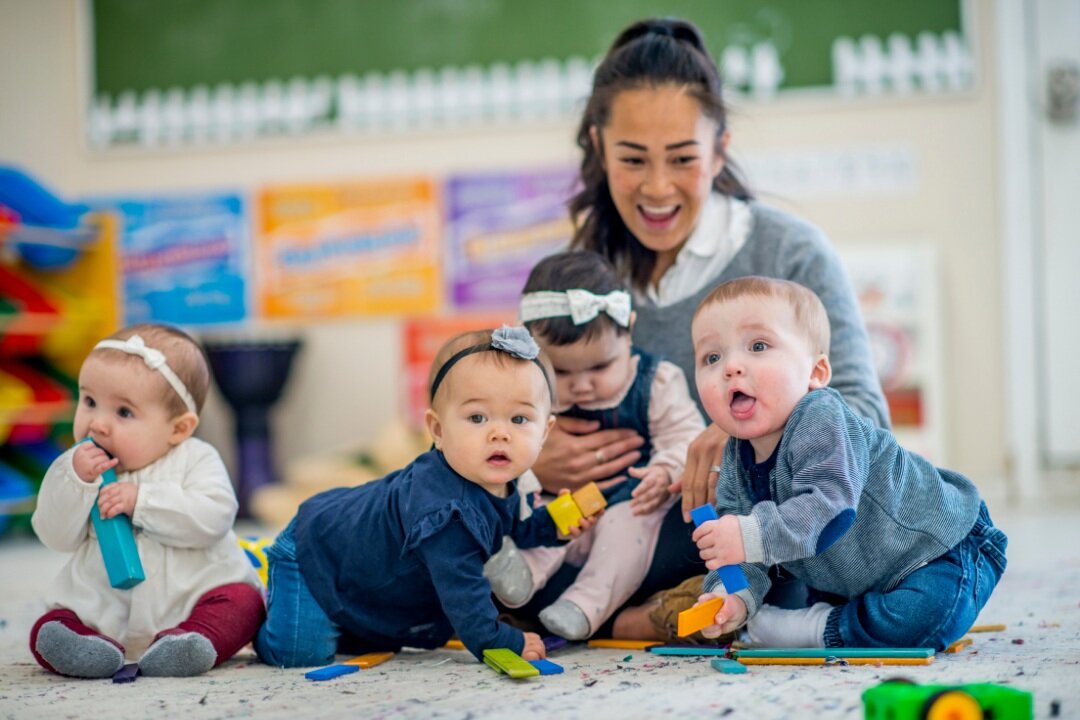Sleep at Daycare: Baby Edition
Concerns about how babies will sleep when starting daycare often consume large amounts of mental energy for moms on maternity leave. I know this well because I remember being worried about this myself when returning to work after my daughter was born many years ago. It also comes up regular in discussions in The Chicago New Moms Group. How your baby will or won’t sleep in daycare is a concern partially due to the fact that the environment in daycare is often vastly different then your environment at home and also because we as moms often find it hard to imagine how it is possible that someone else will be able to care for our babies in the same way that we have been when they are at home. Not to mention the fact that babies in the United States often start daycare at 3 months or even younger which is before sleep patterns are often well established so everything sleep related still feels very much up in the air.
Questions to ask daycare when selecting a daycare/before starting
What is the sleep environment like in the classroom? You may be able to see this on a visit but this article is being written during COVID which means that you may not be able to make an in person visit to a potential daycare. My preference for daycare environments from least preferred to most is: Last choice—cribs around the perimeter of the room, middle choice and most common—cribs all clustered on one side of the room (ideally with that side being a bit darker and possibly with a sound machine or two running), first choice—separate nap room (I’ve only had a handful of families at daycares like this. This is most common in-home daycares.)
What is their policy about putting children down awake? I have encountered some daycares that will not put babies in cribs awake ever out of concern that any crying will disturb other sleeping babies. While this isn’t a big deal with younger babies who may not be ready to learn how to soothe and regulate themselves, it will often become a problem if you have plans for helping your child learn independent sleep skills and can often lead to short naps.
Will the daycare be willing to support any sleep training plans that you have for your child as they become ready? This means putting your child down awake, giving them a period of time to fall asleep, attending to them without necessarily picking them up and doing something to make them fall asleep and if they wake too soon, giving them time to go back to sleep as needed.
Will they be able to follow awake window or scheduling guidelines you give them? For babies, most daycares are pretty flexible about timing for naps but I have encountered some that attempt to get younger babies on fixed schedules that aren’t always age appropriate. For example, I have had a couple of daycares that want to get all babies on a long midday nap schedule around noon which is more of a toddler schedule. This can lead to long periods of awake time between the end of the last nap and when parents can reasonably get them home and to bed at bedtime, leaving children overtired which can then produce night time sleep issues.
Other baby sleep things to think about with daycare
Most daycares will ask parents on their intake forms what your child’s schedule is. I find this question can feel very stressful and overwhelming to new parents whose babies are not often scheduled at the age when they are starting daycare. I always explain that this is a standard question asked for all children starting daycare. If a child was starting at 9 months, those parents would have an easier time answering a scheduling question then parents of a 3 month old.
I also find that daycares have a hard time getting babies down for that first morning nap much before 9am. While at home, your baby may nap at 8am, there is a lot of commotion and activity right at drop off time. Babies are being changed and fed and everyone is getting settled so it can be hard for them to nap so early. Of course this doesn’t mean that your baby may not be tired earlier which can lead to some nap struggles with that first nap when it happens too late. If your baby is an early riser, it might be helpful to do a short cat nap before daycare drop off, if you have time. Or you might take advantage of a little snooze on the way to daycare to help your baby arrive a bit more well rested. When my daughter was a baby going to daycare, she went to the daycare at the hospital that I worked at in New York City. We would take the bus to and from daycare with her in the Baby Bjorn and for the first 2 months or so, I remember she napped in the carrier on the way in every day. This really helped because she hardly napped at all at daycare 😫.
Lastly, I want to reassure you that even if your baby isn’t a great napper at daycare, it doesn’t necessarily mean that they won’t sleep well at night. Daycare is exciting and it is very stimulating. Many babies come home completely exhausted and will want to catch up on lost sleep from the day at night. This means that your baby may need an early bedtime for the first few months as he adjusts to the changes. It also may mean that on the weekends, you will need to be cognizant of the fact that the weekends are going to be a time to catch up. This means that you may need to limit your activities and do a bit more divide and conquer between parents when it comes to errands in order to give your baby time for naps at home. I know that this is a big transition for everyone, but I encourage you to trust your daycare and know that they have raised 100s of more children then any of us have.

